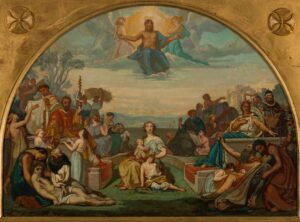All Saints

The feast of All Saints allows us to honour those who have gone before us, having achieved the sanctity to which they were called. It gives us joy to contemplate their glory. It consoles us to know that they can no longer suffer. It fills us with great peace to know that nothing at all will ever disturb that eternal bliss. We often read throughout the year about the various accomplishments of the saints. We admire their generosity, their long-suffering, their love.
But this feast is about much more than recounting extraordinary deeds. It should inflame us with a tremendous yearning. St Bernard of Clairvaux tells us: “Calling the saints to mind inspires, or rather arouses in us, above all else, a longing to enjoy their company, so desirable in itself. We long to share in the citizenship of heaven, to dwell with the spirits of the blessed, to join the assembly of patriarchs, the ranks of the prophets, the council of apostles, the great host of martyrs, the noble company of confessors and the choir of virgins. In short, we long to be united in happiness with all the saints.”
The only way to take part one day in their glory is to march now in their footsteps. And how did they walk? The Gospel just told us: they lived the Beatitudes. If you would like a recipe for holiness, it is right there. Live the Beatitudes and you will become a saint.
Let’s reflect for a moment on the first of them. In both St Matthew’s account that we just heard and in St Luke’s account, it comes first. It is first, because it is the most fundamental, the one upon which the others are based and, in all truth, are already contained. When Our Lord opens His mouth on the mountain and begins to promulgate the New Law, He knows exactly what He is saying and exactly what we need to hear. He cuts to the chase and tells us- Blessed are the poor.
Why does Our Lord start with poverty? Quite simply, because unless we are poor, God cannot fill us. For most of us, our soul resembles a large bowl into which we place pebbles. Every day of our lives, we are adding pebbles, that is, earthly affections and things that take up all the space in our hearts. That bowl is, most of the time, overflowing with pebbles. There is no space for God. Every time He comes, He finds it full, and so has no other option but to leave us with what we think to be our riches.
The American author Flannery O’Connor, once asked about how to become a great writer, said: “There is a great deal that has to either be given up or be taken away from you if you are going to succeed in writing a body of work.” In other words, to become proficient at writing, you cannot be running after all the distractions and pleasures that might pass your way. You have to turn away from them, or someone must take them away from you. Then you can roll up your sleeves and get serious about writing.
What she says here about writing illustrates perfectly the first beatitude. If you want to become a saint, you must first become emptied of all earthly affections. Either you make efforts to give them up, or someone must take them from you.
This is why St Benedict reminds the abbot to keep an eye on the monks, lest they clutter up their lives with trinkets that would distract them from the One Necessary, God Himself. It is why in the degrees of humility, He makes a big deal of accepting lowly tasks, of following the example of the elders, of being treated unfairly, of persevering in the midst of it. It is why he insists so much on silence, for the silent soul is a poor soul who thinks that what others have to say is more important. It is why he is so demanding in obedience, for the obedient soul is a poor soul who has understood how to give up its own will and judgment.
Such are the poor who, already in this life, possess the kingdom of God (as Luke says), for they live in another realm. Although they walk this lowly valley of tears, their only riches are God, and so their mind and heart are with Him. They will possess at the end the kingdom of Heaven (as Matthew says), for God cannot refuse His eternal kingdom to those who have known how to renounce this earth for Him.

And so, on this beautiful feast, let us ask the saints to intercede for us. All the saints were poor. If they had not been poor, they would not have been saved. Some of them, the great ones, impoverished themselves voluntarily. Let us ask them to help us renounce things out of love for God. Some of them were impoverished by events, by sickness, by death, and perhaps for the lowest ranks, only by a long stay in Purgatory that taught them the nothingness of earthly things. Let us ask them too for the grace not to miss the opportunities we have of accepting the various forms of poverty that we encounter along the way, be it an illness, the loss of a job or a loved one, the disappointment of not getting something we dearly wanted, or that of having it taken away, the bitterness of not having our point of view taken into account, of being brushed aside and forgotten.
If we are able to accept those events as they truly are, as God Himself taking away or refusing to give goods that would only keep us far from Him, then we have a chance of truly progressing and being among those souls who, here and now, are poor in spirit, who here and now live in the kingdom of God, and who, on the last day, will be lifted up and exalted high above many others, for they will have understood and put into practice that the only way for God to fill you up is to come to Him with empty hands.

